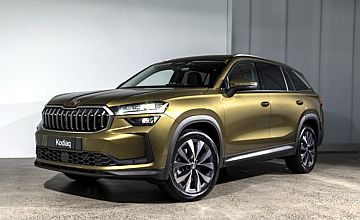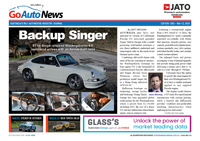Make / Model Search
OptionsCar reviews - Skoda - KodiaqSkoda modelsOverviewNew Kodiaq SUV to compete “far” more aggressively10 Apr 2025 By TOM BAKER Overview
WITH Skoda Australia openly targeting a near-doubling of sales in short order, the arrival of the second-generation Kodiaq three-row SUV is critical to the Czech brand’s ambitions.
The first Kodiaq was a favourite of the motoring press, but while not exactly obscure, it remained something of a hidden gem for buyers—logging about 12,000 sales in Australia since its 2017 launch. For context, the Hyundai Santa Fe outsold it locally by a factor of five.
Skoda intends to compete far more aggressively this time around. The second-generation Kodiaq has arrived in Australia with larger dimensions but similar pricing to the outgoing model—along with a sharp finance offer that the brand says makes it more affordable to own than a Santa Fe or Mazda CX-80.
Those who took a chance on the original Kodiaq need not worry—the new model is more a thoughtful revision than a wholesale reinvention.
It’s 61mm longer, but beneath the surface the more aerodynamic Skoda employs a tauter Evo iteration of the MQB chassis and continues with similarly responsive turbocharged petrol engines, with a plug-in hybrid variant providing about 100km EV range on the horizon.
While the popular Kodiaq RS flagship is set to return later in 2025, three trim grades launch initially, all powered by the same 140TSI engine paired with a seven-speed dual-clutch automatic and all-wheel drive. National drive-away pricing is uniform: $56,990 for the Select, $61,990 for the Sportline, and $65,490 for the limited-run Launch Edition (250 units).
Standard equipment for the Select grade includes 19-inch alloy wheels, LED headlights, full keyless entry, leather upholstery (available in black or cognac), heated front comfort seats with 12-way driver adjustment, a new 13-inch touchscreen with wireless Apple CarPlay and Android Auto, nine-speaker stereo, dual wireless phone chargers, and three-zone climate control.
Spending an extra $5000 steps up to the Sportline, which blackens the Select’s ‘Unique Dark Chrome’ exterior trim and adds 20-inch alloy wheels, Matrix LED headlights with a grille light bar, dynamic indicators, a mix of Suedia and leather upholstery, sports front seats, aluminium pedals and a black headliner.
Many buyers are expected to opt for the Sportline’s $4000 Ultimate Pack, which significantly enhances the specification with adaptive dampers, variable-ratio steering, a power-adjustable passenger seat, 12-speaker Canton sound system, head-up display, heated rear seats, hands-free tailgate operation and a 360-degree parking camera.
Buyers after a more luxurious Kodiaq should move quickly to secure the limited-run Launch Edition, which for $8500 above the Select includes all the Ultimate Pack features (with a nine-speaker Canton), plus front seat ventilation and massage, a panoramic opening sunroof and rear sunshades—while retaining the Select’s dark-chrome exterior trim and black or cognac interior choices.
All three variants share a combined fuel consumption claim of 9.2L/100km, with a full tank of premium petrol affording a theoretical range of 630km. Ownership credentials are strong, with a seven-year, unlimited-kilometre warranty, and an optional seven-year/105,000km service plan available for $4400.
Driving impressions
All versions of the new Kodiaq were made available to sample on a varied mix of roads during the seven-seater’s national media launch, which ran from Tullamarine to Mount Macedon via Victoria’s Calder Freeway, before heading west to Bendigo along more scenic tarmac.
We sampled a Select variant (without options) during the commute leg—where many SUVs would force drivers to grin and bear mediocre suspension tuning over the Calder’s undulating surface. The Kodiaq, however, quickly shows that despite its upsized dimensions, traits like taut body control, a firm yet compliant ride and well-shaped seats remain intact.
A key reason the Kodiaq has long resonated with road testers is this: few large, flexible SUVs offer the discipline and poise of a well-sorted estate car—and the Skoda remains one of them. This is a modern family car with the requisite high-set seating position, but also with character, genuine space, and respectable performance.
That said, after winning a small but loyal following with its impressive debut, the second-generation Kodiaq has lost a slight degree of dynamic sharpness. Keen drivers stepping from Kodiaq I into Kodiaq II may notice marginally more relaxed responses—but only just.
The largest Skoda yet continues to be the most rewarding mainstream seven-seater to drive—and it’s no surprise that the latest Kodiaq remains nearly as engaging as its predecessor from behind the wheel.
The transverse MQB platform carries over in updated Evo form. Most hard points remain identical, but revised welds have increased torsional rigidity, improving crash safety. Suspension geometry sees modest revisions, while the electrical architecture has been significantly upgraded to support more advanced safety and infotainment systems.
Impressively, despite added content and cabling—not to mention 61mm of extra sheetmetal and glass, mostly in the extended rear overhang—the new Kodiaq has gained just 30kg over its predecessor, bringing both the Select and Sportline to 1885kg.
All Australian launch grades use MacPherson strut-type front suspension with lower triangular links, while the rear features a multi-link setup comprising one longitudinal and three transverse arms.
Ride quality on the standard passive dampers is well-judged for Australia’s varied road conditions. Body control is prioritised slightly over softness, though comfort remains more than acceptable, with few sharp bumps transferring into the cabin. Helpfully for the segment, motion sickness is unlikely to be an issue—even when driven with enthusiasm on winding roads.
Enthusiasts will appreciate the broader dynamic range offered by the 15-stage DCC Plus dual-valve adaptive dampers. Standard on the Launch Edition—best paired with the 235/50 R19 wheel and tyre package—they also feature in the Sportline’s optional Ultimate Package, which runs slightly firmer 235/45 R20s that enhance turn-in while only marginally affecting ride quality.
The Kodiaq’s capable chassis and its composed response to being driven briskly over pockmarked Australian roads continue to highlight one of the few shortcomings—the 2.0-litre turbo-petrol engine could use more grunt. The 140kW/320Nm output is adequate rather than generous, as reflected in a claimed 0–100km/h time of 7.9 seconds.
That said, the 140TSI powertrain is considerably more refined than most naturally aspirated rivals and pairs well with the seven-speed wet-clutch DSG and Haldex all-wheel drive system. Still, it’s not what you’d call overpowered—particularly combined with the Sportline’s athletic persona.
Despite the Volkswagen Group’s wide array of EA888 engine tunes, options remain limited for Skoda Australia. A revised 150kW version is available in Europe, while the 195kW/400Nm RS variant is confirmed to return in 2025—but the Sportline arguably deserves the 162kW/350Nm tune used in other VW Group applications.
Even under repeated heavy braking, the all-round disc setup—featuring dual-piston floating callipers up front and single-piston units at the rear—proved effective, offering confident stopping power and reasonable pedal feel.
If there’s a dynamic sweet spot in the range, it’s the limited-run Kodiaq Launch Edition with its standard 19-inch wheels. That said, there are very few drawbacks to the way any of the available variants drive.
Moving inside: the previous Kodiaq’s angular dashboard has been replaced by more organic forms, paired with greater use of sustainable and recycled materials that lend a slightly warmer, softer ambience to the cabin. Making leather upholstery standard on the Select was a response to customer feedback—it’s practical and easy to clean.
Curiously, seat ventilation and massage are exclusive to the Launch Edition. Once you’ve experienced ventilated seats, it’s hard to go without—we’d like to see this feature become available on lower trims in future.
Updated cabin technology includes a 30 per cent larger 13.0-inch touchscreen and a 10.0-inch Virtual Cockpit. Wireless smartphone mirroring is supported, and dual wireless phone chargers are a welcome inclusion. However, as with many Volkswagen Group models sold in Australia, connectivity features and companion app functions available in Europe are not offered locally.
Skoda’s trademark ‘Simply Clever’ features are alive and well. The driver’s door hides a built-in umbrella (the front passenger misses out), while a compact screen cleaner is stored in the centre console—freed up by the new column-mounted shifter. Rear passengers get neat device holders for watching videos on the go.
Second-row passengers benefit from their own climate zone and generous space—especially with the rail-mounted bench slid to its rearmost position. Legroom, headroom and kneeroom are ample, and when third-row access is needed, a reasonable compromise can be achieved using the slider. The seatback split is 60/40 rather than the more flexible 40/20/40.
There remain some areas where the Kodiaq feels a touch tight. Unusually, it’s 18mm narrower than the outgoing model, which was already a squeeze for families needing all three second-row top-tether points. And while some of the added length benefits the third row, that space remains more functional than truly spacious.
Upsized alternatives such as the Mazda CX-90 may better suit some families, but many buyers will appreciate the Kodiaq’s blend of generous interior packaging and city-friendly dimensions. At 4758mm long, it sits at the smaller end of the large SUV segment and remains easy to manoeuvre—though it’s a pity that a 360-degree camera is bundled into an option pack.
The extra 61mm in length has mostly gone to the boot, which now offers 289 litres with all seven seats in use, or 794 litres in five-seat mode. As we’ve come to expect from Skoda, there are ample boot nets and clever aluminium-trimmed luggage retainers to stop cargo sliding around. A large pram—or a full family airport run—fits with ease.
Returning to our Victorian road trip, the upgraded electrical architecture of MQB Evo enables the Kodiaq to support enhanced driver assistance features—including Travel Assist, which combines adaptive cruise control and lane centring. It performed accurately on the highway, gently guiding the vehicle while the driver kept a hand on the wheel.
Other features include traffic sign recognition, blind-spot monitoring with rear cross-traffic alert, and autonomous emergency braking capable of detecting vehicles, pedestrians and cyclists. In testing, the system showed more refined tuning than many rivals (and no frustrating speed warnings)—though bright, low-angle sunlight briefly disabled the forward sensors and triggered warning messages.
Our test covered 355 kilometres across varied terrain over seven hours and returned solid real-world efficiency. With a bias toward free-flowing rather than stop-start driving, the trip computer showed 8.4L/100km—yielding a projected range of 690km. That’s better than most EVs, though rural buyers may still long for a diesel’s 1000km capability.
Overall, the latest Kodiaq stays close to the formula of its predecessor—and that’s no bad thing. It is slightly larger and, in turn, easier to live with day to day—but it remains the discerning driver’s choice in the large SUV segment. Competitive pricing (particularly when comparing weekly repayments to rivals) should allow it to widen the net this time around.  All car reviews Alfa Romeo Alfa Romeo Abarth Abarth Audi Audi Aston Martin Aston Martin BMW BMW Bentley Bentley Chrysler Chrysler Chevrolet Chevrolet Dodge Dodge Citroen Citroen Ferrari Ferrari DS DS Ford Ford Fiat Fiat FPV FPV Foton Foton Haval Haval Great Wall Great Wall Honda Honda Holden Holden Hyundai Hyundai HSV HSV Isuzu Isuzu Infiniti Infiniti Jaguar Jaguar Iveco Iveco Kia Kia Jeep Jeep Land Rover Land Rover Lamborghini Lamborghini Maserati Maserati Lexus Lexus McLaren McLaren Mazda Mazda Mercedes-Benz Mercedes-Benz Mitsubishi Mitsubishi Mini Mini Opel Opel Nissan Nissan Porsche Porsche Peugeot Peugeot Ram Ram Proton Proton Rolls-Royce Rolls-Royce Renault Renault Skoda Skoda Saab Saab SsangYong SsangYong Smart Smart Suzuki Suzuki Subaru Subaru Toyota Toyota Tesla Tesla Volvo Volvo |
OptionsClick to share
|









Facebook Twitter Instagram